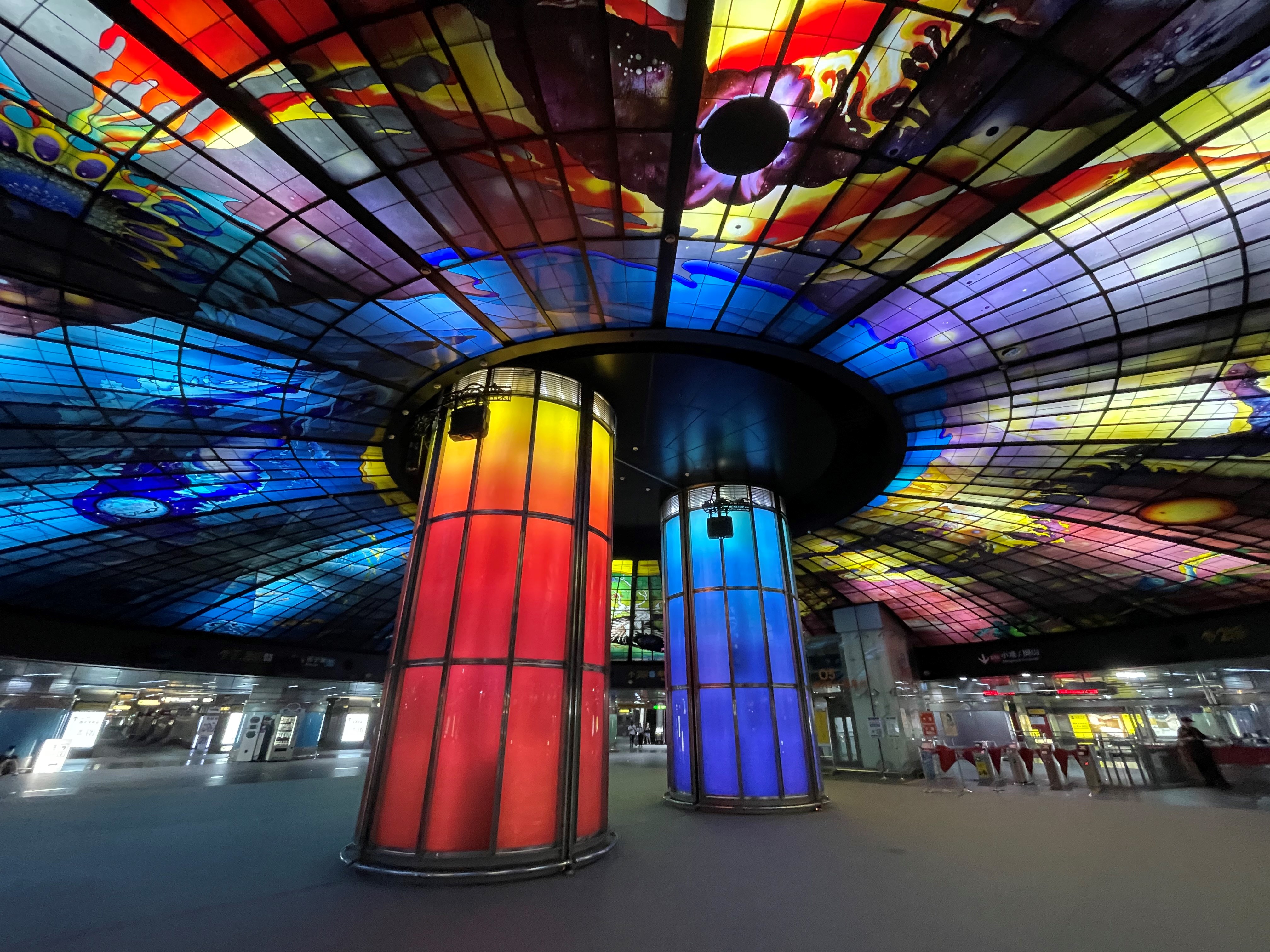|
San Ramón Metro Station
San Ramón station is a metro station located on Line 4A of the Santiago Metro in Santiago, Chile between Santa Rosa and La Cisterna station. It lies along the Vespucio Sur Freeway, near its junction with Almirante Latorre Street. The station has disabled access. The station was opened on 16 August 2006 as part of the inaugural section of the line between Vicuña Mackenna and La Cisterna. In the surrounding area can be found the San Ramón commune municipality building and La Bandera Park. Etymology The station is named after San Ramón commune A commune is an alternative term for an intentional community. Commune or comună or comune or other derivations may also refer to: Administrative-territorial entities * Commune (administrative division), a municipality or township ** Communes of ..., where it is located. [...More Info...] [...Related Items...] OR: [Wikipedia] [Google] [Baidu] |
List Of Santiago Metro Stations
The Santiago Metro ( es, Metro de Santiago) is a rapid transit system serving the city of Santiago, the capital of Chile. It currently consists of seven lines (numbered 1-6 and 4A), 136 stations, and of revenue route. The system is managed by the state-owned Metro S.A. and is the first and only rapid transit system in the country. The Santiago Metro carries around 2.5 million passengers daily. This figure represents an increase of more than a million passengers per day compared to 2007, when the ambitious Transantiago project was launched, in which the metro plays an important role in the public transport system serving the city. Its highest passenger peak was reached on 2 May 2019, reaching 2,951,962 passengers. In June 2017 the government announced plans for the construction of Line 7, connecting Renca in the northwest of Santiago with Vitacura in the northeast. The new line will add 26 kilometers and 19 new stations to the Metro network, running along the municipalities of Re ... [...More Info...] [...Related Items...] OR: [Wikipedia] [Google] [Baidu] |
Chile
Chile, officially the Republic of Chile, is a country in the western part of South America. It is the southernmost country in the world, and the closest to Antarctica, occupying a long and narrow strip of land between the Andes to the east and the Pacific Ocean to the west. Chile covers an area of , with a population of 17.5 million as of 2017. It shares land borders with Peru to the north, Bolivia to the north-east, Argentina to the east, and the Drake Passage in the far south. Chile also controls the Pacific islands of Juan Fernández, Isla Salas y Gómez, Desventuradas, and Easter Island in Oceania. It also claims about of Antarctica under the Chilean Antarctic Territory. The country's capital and largest city is Santiago, and its national language is Spanish. Spain conquered and colonized the region in the mid-16th century, replacing Inca rule, but failing to conquer the independent Mapuche who inhabited what is now south-central Chile. In 1818, after declaring in ... [...More Info...] [...Related Items...] OR: [Wikipedia] [Google] [Baidu] |
Communes Of Chile
A commune ( es, comuna, ) is the smallest administrative subdivision in Chile. It may contain cities, towns, villages, hamlets as well as rural areas. In highly populated areas, such as Santiago, Valparaíso and Concepción, a conurbation may be broken into several communes. In sparsely populated areas, conversely, a commune may cover a substantial rural area together with several settled areas which could range from hamlets to towns or cities. The term "commune" is ambiguous in English, but the word is commonly used in translation for "comuna", although with some controversy among translators. A comuna is similar to a "county" in Anglo-American usage and practice, and may be more universally understood as a "municipality". Each commune or municipality is governed by a directly elected body known as a municipal council (''concejo municipal'') consisting of a mayor (''alcalde'') and a group of councillors (''concejales''), for a period of four years. The communal civil service a ... [...More Info...] [...Related Items...] OR: [Wikipedia] [Google] [Baidu] |
San Ramón, Chile
San Ramón (Spanish for "Saint Ramón") is a commune of Chile located in Santiago Province, Santiago Metropolitan Region; part of Greater Santiago. Demographics According to the 2002 census of the National Statistics Institute, San Ramón spans an area of and has 94,906 inhabitants (46,596 men and 48,310 women), and the commune is an entirely urban area. The population fell by 5.9% (5,911 persons) between the 1992 and 2002 censuses. Stats *Average annual household income: US$23,878 ( PPP, 2006) *Population below poverty line: 16.7% (2006) *Regional quality of life index: 70.19, mid-low, 42 out of 52 (2005) *Human Development Index: 0.679, 170 out of 341 (2003) Administration As a commune, San Ramón is a third-level administrative division of Chile administered by a municipal council, headed by an alcalde who is directly elected every four years. The 2012-2016 alcalde is Miguel Ángel Aguilera Sanhueza ( PS). The communal council has the following members: * Mónica Aguilera Sa ... [...More Info...] [...Related Items...] OR: [Wikipedia] [Google] [Baidu] |
Vicuña Mackenna Metro Station
Vicuña Mackenna is a station on the Santiago Metro in Santiago, Chile. It is a transfer station between the Line 4 and the Line 4A and is the eastern terminus of the Line 4A. The Line 4 station was opened on 2 March 2006 as part of the connection between Grecia and Vicente Valdés. The Line 4A station was opened on 16 August 2006 as part of the inaugural section of the line between Vicuña Mackenna and La Cisterna La Cisterna (, Spanish for "the cistern") is a commune of Chile and census-designated city located in Santiago Province, Santiago Metropolitan Region. It was founded on 30 May 1925. It is part of Greater Santiago. Demographics According to the .... The station is composed of a street-level mezzanine, an embanked level, which is located along Vespucio Sur Freeway, and an underground level. The lower level was originally designed to serve both lines as a kind of branch for the would-be Line 4A, but it currently only serves Line 4. The embankment has a temporary ... [...More Info...] [...Related Items...] OR: [Wikipedia] [Google] [Baidu] |
La Cisterna Metro Station
La Cisterna is a station on the Santiago Metro in Santiago, Chile. It is an interchange between lines 2 and 4A, and consists of two parts, one built in an open trench and the other partially excavated, joined by pedestrian tunnels. The Line 2 platforms opened on 22 December 2004 as part of a southward extension of Line 2 from Lo Ovalle metro station. The Line 4A platforms opened on 16 August 2006 as part of the inaugural section of the line between Vicuña Mackenna and La Cisterna. It is named after La Cisterna, the district where the station is located and whose town hall is close to it. The station on Line 4A is part of an embanked section at the middle of Vespucio Sur Freeway and is spanned by a bridge carrying Gran Avenida, whose central deck forms the roof of the mezzanine of the station. The side platforms and tracks of the underground station are built within an excavated -long tunnel, which is traversed by three tunnels containing a bridge over platforms each. The no ... [...More Info...] [...Related Items...] OR: [Wikipedia] [Google] [Baidu] |
Santa Rosa Metro Station
Santa Rosa station www.metrosantiago.cl retrieved May 20, 2013 is an embanked located on Line 4A of the in , , between the [...More Info...] [...Related Items...] OR: [Wikipedia] [Google] [Baidu] |
Santiago
Santiago (, ; ), also known as Santiago de Chile, is the capital and largest city of Chile as well as one of the largest cities in the Americas. It is the center of Chile's most densely populated region, the Santiago Metropolitan Region, whose total population is 8 million which is nearly 40% of the country's population, of which more than 6 million live in the city's continuous urban area. The city is entirely in the country's central valley. Most of the city lies between above mean sea level. Founded in 1541 by the Spanish conquistador Pedro de Valdivia, Santiago has been the capital city of Chile since colonial times. The city has a downtown core of 19th-century neoclassical architecture and winding side-streets, dotted by art deco, neo-gothic, and other styles. Santiago's cityscape is shaped by several stand-alone hills and the fast-flowing Mapocho River, lined by parks such as Parque Forestal and Balmaceda Park. The Andes Mountains can be seen from most points ... [...More Info...] [...Related Items...] OR: [Wikipedia] [Google] [Baidu] |
Santiago Metro
The Santiago Metro ( es, Metro de Santiago) is a rapid transit system serving the city of Santiago, the capital of Chile. It currently consists of seven lines (numbered 1-6 and 4A), 136 stations, and of revenue route. The system is managed by the state-owned Metro S.A. and is the first and only rapid transit system in the country. The Santiago Metro carries around 2.5 million passengers daily. This figure represents an increase of more than a million passengers per day compared to 2007, when the ambitious Transantiago project was launched, in which the metro plays an important role in the public transport system serving the city. Its highest passenger peak was reached on 2 May 2019, reaching 2,951,962 passengers. In June 2017 the government announced plans for the construction of Line 7, connecting Renca in the northwest of Santiago with Vitacura in the northeast. The new line will add 26 kilometers and 19 new stations to the Metro network, running along the municipalities of Re ... [...More Info...] [...Related Items...] OR: [Wikipedia] [Google] [Baidu] |
Metro Station
A metro station or subway station is a station for a rapid transit system, which as a whole is usually called a "metro" or "subway". A station provides a means for passengers to purchase Train ticket, tickets, board trains, and Emergency evacuation, evacuate the system in the case of an emergency. In the United Kingdom, they are known as underground stations, most commonly used in reference to the London Underground. Location The location of a metro station is carefully planned to provide easy access to important urban facilities such as roads, commercial centres, major buildings and other Transport hub, transport nodes. Most stations are located underground, with entrances/exits leading up to ground or street level. The bulk of the station is typically positioned under land reserved for public thoroughfares or Urban park, parks. Placing the station underground reduces the outside area occupied by the station, allowing vehicles and pedestrians to continue using the ground-le ... [...More Info...] [...Related Items...] OR: [Wikipedia] [Google] [Baidu] |


